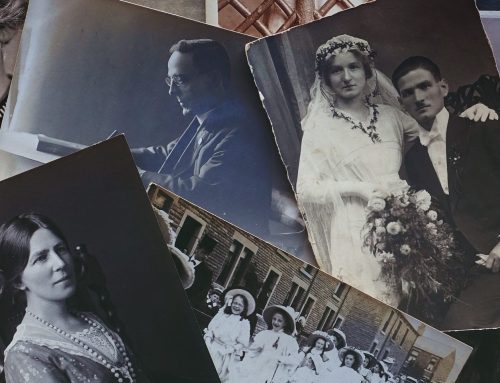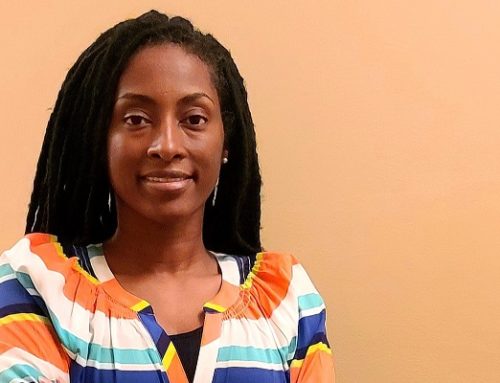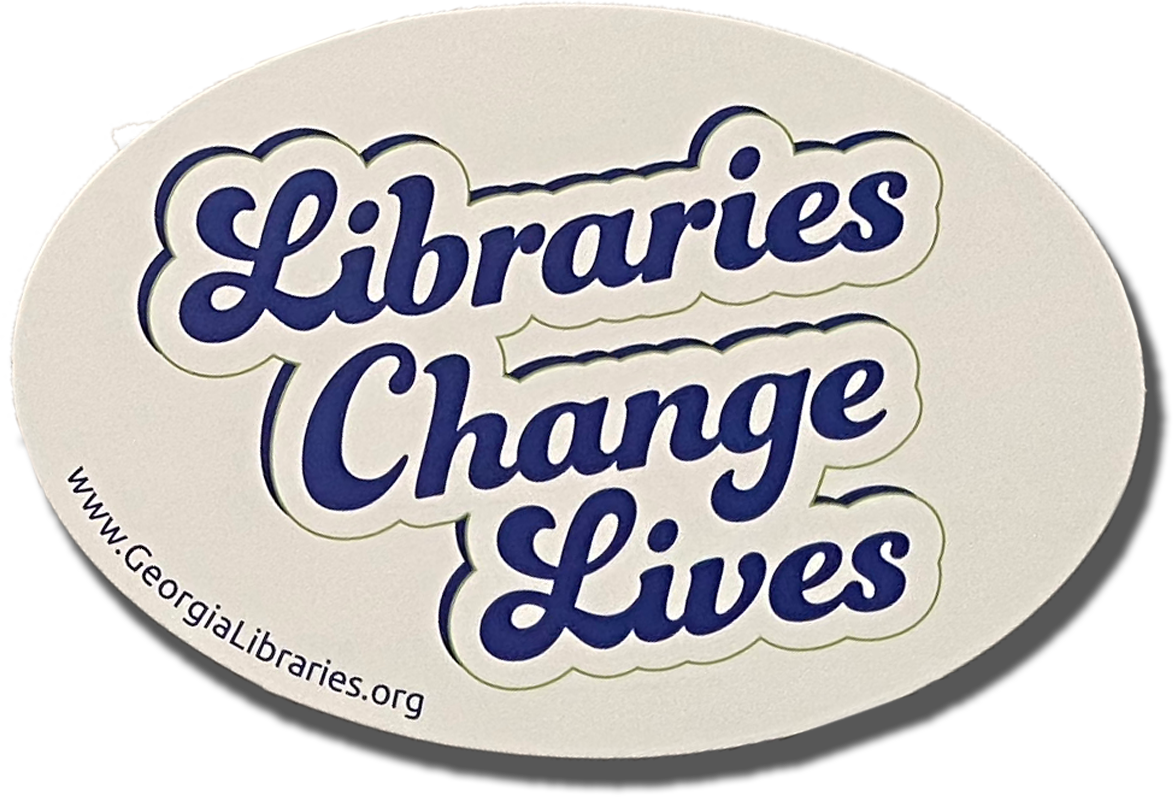“I want to see myself in history, so it’s important that the stories and the collections of Black people are documented, preserved, and available.”
On the third floor archives at the Auburn Avenue Research Library on African American Culture and History in Atlanta (AARL), archivist Derek Mosley unbuckles the clasp on a square cardboard box containing a decades-old reel of film. While it seems ordinary in appearance, its contents are anything but. The circular metal container inside has a handwritten label adhered with tape yellowed from many years, upon which is written in cursive: On this film, Andrew Young is narrating the story of the Civil Rights Movement.

Derek Mosley holds an image of Annie L. McPheeters, one of Atlanta’s first African American professional librarians and a champion of African American culture and history. Her story will be included in a digital exhibit on the origins of the Auburn Avenue Branch Library, which opened in 1921 and was the first public library in Atlanta accessible to Black people.
“The Andrew Young collection is our most heavily used, and researchers come from around the world to access it,” said Mosley. “People have never been able to access some of these reels, betas, or cassette tapes because we don’t have the correct players.”
The personal collection of the civil rights movement leader, civic activist, elected official, ambassador, and adviser to presidents includes papers, photos, and more than 300 recordings in various obsolete formats, and it is being digitized in part through a partnership with the Georgia Public Library Service (GPLS), which provided funding through the American Rescue Plan Act as well as digital preservation storage for the materials.
“The Auburn Avenue Research Library on African American Culture and History holds vital sources of African American history in the South,” said Angela Stanley, assistant state librarian for innovation and collaboration at Georgia Public Library Service. “Derek’s leadership helps us understand how GPLS can support the digital preservation of their historical collections as well as those at public libraries across the state.”
Through his role managing the archives at AARL, a special library of the Fulton County Library System, Mosley finds ways to make Black history more accessible.
“I want to see myself in history, so it’s important that the stories and the collections of Black people are documented, preserved, and available,” he said.
AARL is the first public library in the Southeast to offer specialized reference and archival collections dedicated to the study and research of African American culture and history and of other peoples of African descent.
“Every day is something new,” said Mosley. “I open up a box and fall down a rabbit hole trying to figure out the context of an item. It’s a never-ending array of Black history in Atlanta, Georgia, and the Southeast.”
He has been a champion for raising awareness and improving access to Black history and culture throughout his career at AARL, the Ernest J. Gaines Center at the University of Louisiana at Lafayette, and Atlanta University Center’s Archives Research Center. His efforts were recognized in 2023 through an appointment as a Fellow of the Society of American Archivists (SAA). This distinction is the highest honor given by SAA and is awarded for outstanding contributions to the archives profession.
“Derek has worked diligently not only on behalf of the preservation of Atlanta African American archival collections but also for the often underappreciated materials held by public libraries more broadly,” said Stanley. “We first collaborated to feature AARL in Georgia’s Treasures, the first statewide print booklet listing public library archival and special collections repositories in Georgia.”

The personal collection of Ambassador Andrew Young includes papers, photos, and more than 300 recordings in various obsolete formats, including those pictured here. Materials are being digitized in part through a partnership with the Georgia Public Library Service.
DIGITIZATION OF AFRICAN AMERICAN FUNERAL PROGRAMS
Known for his collaborative spirit and support of allied organizations, Mosley also partnered with the Atlanta chapter of the Afro-American Historical and Genealogical Society to spearhead a joint project with Georgia Public Library Service to digitize over 11,500 pages of funeral programs from 1886-2019 held by both institutions.
“Funerals are such an important space for African Americans,” said Mosley. “The tradition of funerals is not reserved for the wealthy or privileged, but the community. It is that lasting document of someone’s life. In the program is the history, and throughout this collection you see the evolution of the stories people left for future generations. I was amazed at the one-pagers from the 1940s, and by the 2000s there were full color, multiple pages, and photographs highlighting the life and love shared by the families. This collection is a public space for legacy.”
One of the programs that he found powerful was for Judge Austin Thomas Walden, the first Black municipal judge in Georgia since the Reconstruction era. He also served in World War I as an infantryman and held many leadership positions in Georgia, including with the NAACP. His 1965 benediction was given by the Rev. Martin Luther King, Sr.
From the funeral program of Judge Austin Thomas Walden: He became a founder and co-chairman of the Atlanta Negro Voters League. His election in 1962 to membership on the State Democratic Party of Georgia and his appointment by Governor Carl E. Sanders as a delegate to the Democratic National Convention in 1964 were firsts in Georgia for members of his race. Also, his appointment in 1964 by Mayor Ivan Allen as an Alternate Judge of the Municipal Courts of Atlanta was the first such appointment in Georgia and the South since the days of Reconstruction.
Documenting both urban and rural areas, the collection provides important information for genealogical research and for understanding African American life during different time periods. For example, you can read how some families migrated to the North to cities like Chicago and New York to pursue job opportunities. Some programs document 20 or more names in one family or in a small town, including elders in a community. Individuals can access the collection through the Digital Library of Georgia at dlg.usg.edu/collection/aarl_afpc.
DIGITAL EXHIBIT ON ATLANTA’S FIRST BLACK PUBLIC LIBRARY
Mosley is currently leading a project to create a digital exhibit on the origins of the Auburn Avenue Branch Library, which opened in 1921 and was the first public library in Atlanta accessible to Black people. The exhibit will explore its origins, including the push for its creation by W.E.B. Dubois and faculty from Atlanta University Center, as well as its programming and benefits to the community.
“This library was the only place in the city where Black citizens could check out books and get resources for many years,” said Mosley.
The building was torn down in the 1950s and sat on land now occupied by the Martin Luther King, Jr. Center. The exhibit will incorporate photos, documents, and narrative to tell the story of the branch.
One of the images included is of Annie L. McPheeters, one of Atlanta’s first African American professional librarians and a champion of African American culture and history. She is pictured at a desk, smiling with an open book in front of her.
McPheeters provided library resources and services to segregated communities through programs for adults and children, such as book reviews, story hour, and a parent/teen discussion group.
“People everywhere will be able to access this digital exhibit to learn more about influential people like McPheeters and so many others,” said Mosley. “Placing materials in context as an exhibit allows us to unravel the story so individuals can learn more about this important history of our city.”
This will be the first digital exhibit done by AARL, and it is being produced in partnership with GPLS as part of the DigEx Program, which empowers libraries to use their unique digitized materials to tell the stories of their libraries and communities. Through the program, library staff learn how to conceive, plan, design, and refine a digital exhibit. GPLS provides administrative and training support while leaving local site-level control to the libraries to create their digital content.
A LEGACY IN PROGRESS
Mosley has mentored dozens of new archivists, helping them get settled in the field, writing recommendation letters, and serving as a reference. His leadership in Atlanta, Georgia, and nationally have brought attention to overlooked aspects of African American history. His partnership with Georgia Public Library Service has led to digitization of local African American collections that may have otherwise fallen into disrepair or forgotten.
“We want anyone to be able to take their question about history, say it’s, ‘What was a day in the life of an average African American worker in Atlanta during a certain time period?’ and there will be a collection where you can get that information and understand the context of living during that time,” he said. “We are documenting history. This is what makes our work so impactful, we are documenting everyone’s history, not just one color or one class.”
To learn more about the Auburn Avenue Research Library on African American Culture and History click here.
To read more about how Georgia Public Library Service supports preservation of local history and genealogy resources at public libraries click here. GPLS’ digitization initiative is supported by funds from the Library Services and Technology Act through the Institute of Museum and Library Services.

Derek Mosley reshelves a box of
archival materials at the Auburn
Avenue Research Library on African American Culture and History (AARL).

An image of the now demolished Auburn Avenue Branch Library, which opened in 1921 and was the first public library in Atlanta accessible to Black people. AARL is creating a digital exhibit about the library.

Mosley examines the funeral program for Andrew Young’s first wife, Jean Childs Young, who died in 1994. Her program was recently digitized.








